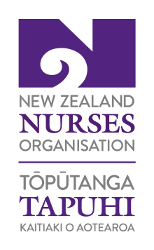 New Zealand Nurses Organisation media release, 12 June 2020
New Zealand Nurses Organisation media release, 12 June 2020
Pay talks stalled yesterday and Mediation is the next step for primary health care nurses, says the New Zealand Nurses Organisation (NZNO). NZNO has been negotiating the Primary Health Care Multi-Employer Collective Agreement (PHC MECA) since November last year for 3400 nurses, receptionists and administrators across more than 500 practices and accident or medical centres.
NZNO Industrial Advisor Chris Wilson said the employers were not able to increase their offer rejected last month by NZNO members, and that additional funding is clearly needed before they could. However they were also clear that pay parity with DHB nursing staff is necessary to continue delivery of quality primary health care.
“It is very disappointing for all parties that we have not yet gained the Government funding needed despite approaches to the Health Minister, the Ministry of Health and DHB officials by NZNO and organisations such as the New Zealand Medical Association, Green Cross Limited and General Practice NZ.”
NZNO released a petition two weeks ago asking the Government to intervene and that DHBs urgently provide the funding needed to fix pay parityy and properly value primary health care workers. Almost 8000 people signed and Ms Wilson says the messages are very clear.
"People want these staff to be properly valued and they want enough of them available to provide the primary health care services we all need. General practices and emergency centres are the front door of the health system."
An experienced nurse covered by the PHC MECA is currently paid 10.6 percent less than their DHB colleague with the same qualifications and experience.
“This is completely unjust and undervalues the amazing work these nurses do in providing expert care in the community – demonstrated so clearly in the COVID-19 response,” Ms Wilson said.
The next stage in the negotiation process is Mediation, which will take place on 29 June.
“That leaves two weeks to fix the disparity and it really comes down to political will. Budget 2020 put an extra $3.92 billion into DHBs over the next four years whereas pay parity for PHC nurses would cost a mere $15 million.
“Without additional funding, recruitment and retention issues will only be solved by passing additional costs on to the consumers. This is not a responsible solution and clearly not in the interests of communities."
On Friday 19 June primary health care workers will be highlighting the pay parity issue by holding a “Seeing Red Day” to demonstrate that they are in fact “Seeing Red”. General practices and emergency centres across the country will be decked out in red and staff will wear items of red clothing.
Primary health care funding comes through the Vote Health Budget and is allocated to general practices and other services via the DHBs and primary health organisations (PHOs).
-Ends-
Media inquiries: Rob Zorn, NZNO Media and Communications Advisor: 027 431 2617.
More information
People signing the petition for pay parity with DHB nurses were able to include comments. Here are just a few select examples.
Nurses
“I absolutely support my primary health colleagues in their fight for pay parity. It is outrageous that any pay increases do not apply to all professional nurses.”
“After 45 years working in primary and secondary care, I am fully aware of the different skills required and demands on nurses in each sector. Neither group is more important, or more essential, to the health of the patient, the community or the nation – so why does our pay not reflect that? General practice a private concern, so not your problem??? Get real!!”
“After 50 years of Nursing I feel undervalued and underpaid. We are worth so much more.”
Doctors
“Our primary care nurses are one of the key foundations of our health system in New Zealand. I've seen first-hand that many amazing practice nurses are considering leaving to go to hospital nursing because of the pay inequality.”
"As a GP and practice owner we are now in the position of being so restricted in what we can charge patients that it makes it near impossible to recover business expenses (such as a fair wage for practice nurses) by passing those costs onto our users (patients). I support the NZNO in their position of requesting additional funding from MOH/DHB's to cover the cost of a nurse wage increase. "
“As a GP, we could not do our jobs and promote the health of Kiwis without our amazing primary care nurses. General practice is the backbone of healthcare in Aotearoa and the nurses who work tirelessly educating and supporting patients are priceless. Please help us support our nurses and show them we value them!”
Patients
“A chat with your practice nurse is always helpful. They provide an amazing service for ALL age groups. They should never be undervalued!”
“Please value the hard work these nurses do. They save the DHBs money and resources by preventing hospitalisations and by supporting people with chronic/complex health needs… to self-manage in the community. The least the DHBs can do is pay them the same as their nursing colleagues in the hospitals.”
“I have struggled significantly with health issues for years, leading me to spend time at my GP clinic frequently and being in hospital. I spend more time with the nurses than I